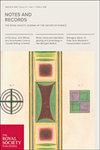伽森迪的第二个想法。从唯物主义认识论到为二元论辩护:与笛卡儿争论的持久影响
IF 0.6
3区 哲学
Q3 HISTORY & PHILOSOPHY OF SCIENCE
Notes and Records-The Royal Society Journal of the History of Science
Pub Date : 2023-11-01
DOI:10.1098/rsnr.2023.0006
引用次数: 0
摘要
物质是否能产生认知是早期现代反思中一个非常有争议的话题。在他与笛卡尔的争论中,伽桑第似乎支持对认知的“唯物主义”理解。伽森迪的两个反对意见与这一观点特别相关:他质疑想象力和智力之间的区别,并认为动物和人类的认知只是数量上的不同。由于传统上认为智力是非物质的,而想象力被理解为一种身体的能力,这些主张似乎包含了人类灵魂的自然形象,以及物质可以产生思维的潜力。在这里,我认为,加桑迪的主张不仅是他对笛卡尔的辩论风格的结果;相反,它们是伽桑蒂自1620年代初以来一直追求的知识议程的一部分。然后,我分析了加森迪在《批判》(1649)和《哲学宪章》(1658)中观点的转变,在这两本书中,加森迪提出了智力的非物质性及其与想象的真正区别的论点。我认为,伽森迪早期对笛卡尔的反对为他提供了修正自己在这些问题上立场的材料。然后,我将展示这种转变的一些含义。最后,我提出了一些关于其原因的假设。本文章由计算机程序翻译,如有差异,请以英文原文为准。
Gassendi's second thought. From a materialistic picture of cognition to the defence of dualism: the lasting influence of the polemic with descartes
Whether matter could engender cogitation was a very divisive topic of early modern reflection. In his polemic with Descartes, Gassendi appeared to endorse a ‘materialistic’ understanding of cognition. Two objections by Gassendi were particularly relevant to this claim: he challenged the distinction between imagination and intellect, and argued that animal and human cognition only differed quantitatively. Since the intellect was traditionally seen as immaterial, while the imagination was understood as a bodily faculty, these claims appeared to entail a naturalized image of the human soul, and the potential that matter could generate cogitation. Here, I argue that Gassendi's claims were not only a result of his polemical vein against Descartes; rather, they were part of an intellectual agenda that Gassendi had been pursuing since the early 1620s. I then analyse Gassendi's change of perspective in Animadversiones (1649) and Syntagma philosophicum (1658), where Gassendi presented arguments for the immateriality of the intellect and its true distinction from the imagination. I argue that Gassendi's early objections against Descartes provided him with material to revise his own position on these subjects. I then show some of the implications of such a change of heart. Lastly, I address some hypotheses of its cause.
求助全文
通过发布文献求助,成功后即可免费获取论文全文。
去求助
来源期刊
CiteScore
1.50
自引率
0.00%
发文量
45
审稿时长
>12 weeks
期刊介绍:
Notes and Records is an international journal which publishes original research in the history of science, technology and medicine.
In addition to publishing peer-reviewed research articles in all areas of the history of science, technology and medicine, Notes and Records welcomes other forms of contribution including: research notes elucidating recent archival discoveries (in the collections of the Royal Society and elsewhere); news of research projects and online and other resources of interest to historians; essay reviews, on material relating primarily to the history of the Royal Society; and recollections or autobiographical accounts written by Fellows and others recording important moments in science from the recent past.

 求助内容:
求助内容: 应助结果提醒方式:
应助结果提醒方式:


